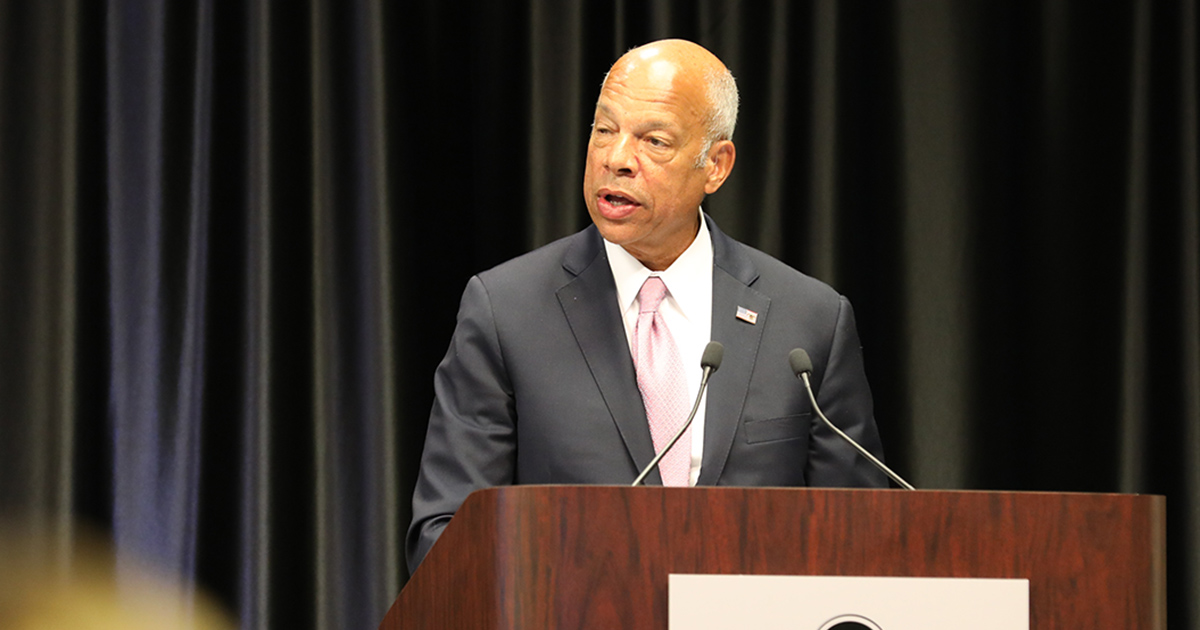
Hon. Jeh Charles Johnson, former U.S. Secretary of Homeland Security and ABA Task Force for American Democracy co-chair, speaks on "The Threat to Democracy."
July 11, 2024 – A dozen speakers recently gave sobering presentations on the threat to democracy during a nonpartisan event from the American Bar Association’s Task Force for American Democracy, in partnership with the State Bar of Wisconsin.
The program, called
Wisconsin: Elections in the 21st Century (watch now) was held in-person July 9 at the State Bar Center in Madison, and live-streamed.
The program was designed to promote understanding of the American election process and learn where to get reliable election information, according to
Michelle Behnke , a former State Bar president (2004-05), nominated to serve as ABA president in 2025.
Behnke and former State Bar President John Skilton (1995-96) co-chaired the
Wisconsin Host Committee for the ABA Task Force on Democracy.
The listening session was the fourth held by the ABA task force. The first three took place in Georgia, Michigan, and Pennsylvania, all crucial election states.
In opening remarks, Behnke said the ABA chose battleground states because voters there are likely to be bombarded with disinformation before the November election.
Current ABA President
Mary Smith spoke after Behnke. Smith said the threat to democracy is the most important issue facing the U.S. She cited the following statistics:
one in six American adults can’t name even one of the three branches of the U.S. government;
less than one-third of Millennials consider it essential that they live in a democracy;
about 38% of Americans support authoritarianism as a response to the direction of democracy; and
nearly one-quarter of Americans say they’re ready to use violence if their candidate loses.
“We’re living in a time where the lack of basic civics knowledge … has weakened our democracy, threatened the rule of law, and put the possibility of political violence on our radar screens,” Smith said.
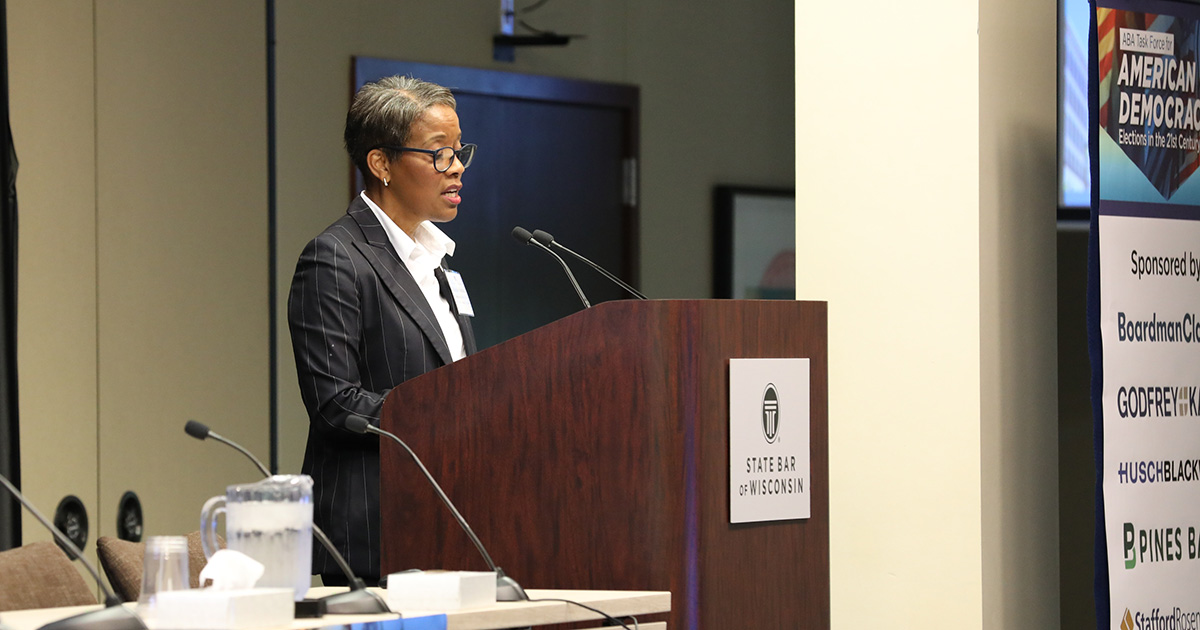
Former State Bar of Wisconsin president Michelle Behnke, nominated to become ABA president in 2025, was co-chair of the Wisconsin Host Committee for the ABA event.
‘Our Democracy Is Not as Strong as We Thought’
Jeh Johnson , former U.S. Secretary of Homeland Security under President Barack Obama, also discussed the looming threat to democracy.
Johnson, a former assistant U.S. Attorney, cited a “rising, dangerous, and naïve fascination with alternate forms of government.”
“Our democracy, once considered the most durable on the planet, is not as strong as we thought,” said Johnson, now a partner at Paul Weiss, based in New York City. “And there are those who seemed determined to push it to the breaking point.”
Johnson, who said bar associations play a key role in defending democracy, co-chairs the ABA Task Force for American Democracy with retired Fourth Circuit Court of Appeals Judge J. Michael Luttig, who was appointed by President George H.W. Bush.
He said the task force would make recommendations for reform at the ABA’s upcoming annual convention.
“We must never take for granted the virtue of living in a free democracy,” Johnson said. “Democracy is like water: you don’t understand its importance until you’re thirsty or your land’s been scorched by wildfire.”
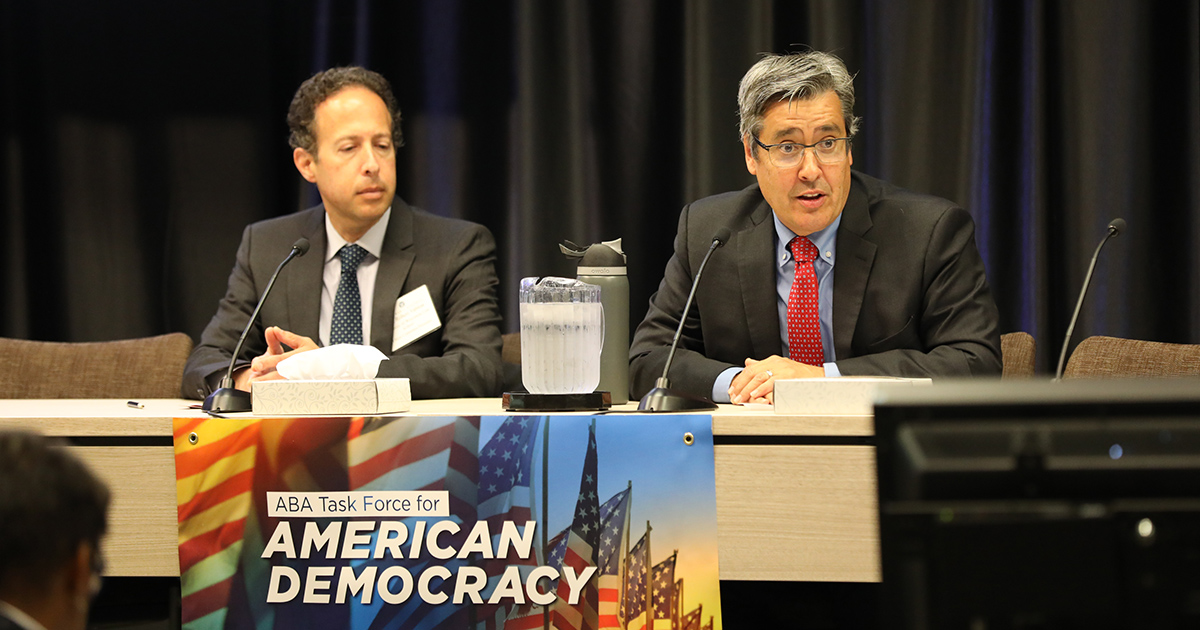
U.W. Law School Dean Daniel Tokaji (right) spoke on federal election litigation. U.W. Law Prof. Robert Yablon (left) spoke on the Wisconsin Constitution and election law.
Litigation Landscape
U.W. Law School Dean
Daniel Tokaji and U.W. Law School Professor
Robert Yablon kicked off the panels with a discussion of recent trends in election litigation.
Tokaji, who has coauthored a law school textbook on election law, said many of the federal election lawsuits filed during or in the wake of the 2020 election were concerned with measures adopted by election officials to deal with the pandemic.
Seventy-three of those lawsuits advanced a variety of claims about the election’s integrity, Tokaji said, and in only two of them did plaintiffs prevail, on minor technical issues.
“The lesson I take is that our legal system works,” Tokaji said. “You can make all sorts of false claims about ‘stolen elections’ in the media and on social media and a lot of people believe those claims.”
“But try making those claims in a court of law, where judges – whether appointed by Democrats or Republicans – will demand evidence, and you will – or at least you did in 2020 – have a lot less success,” Tokaji said. “This is something that we, as lawyers, should be proud of.”
Yablon, who co-directs the State Democracy Research Initiative at U.W. Law School, said the 2022 mid-term election was the most litigious one in American history. Yablon said that 70% of the lawsuits filed in 2022 were filed in state courts.
That’s because most elections are governed by state statutes and regulations, Yablon said, and because state constitutions explicitly address voting and voting rights.
For instance, Yablon said that while the U.S. Constitution does not explicitly guarantee citizens the right to vote, the Wisconsin Constitution does, in Article III, Section 1. And the Wisconsin statutes contain 250 sections governing the conduct of elections.
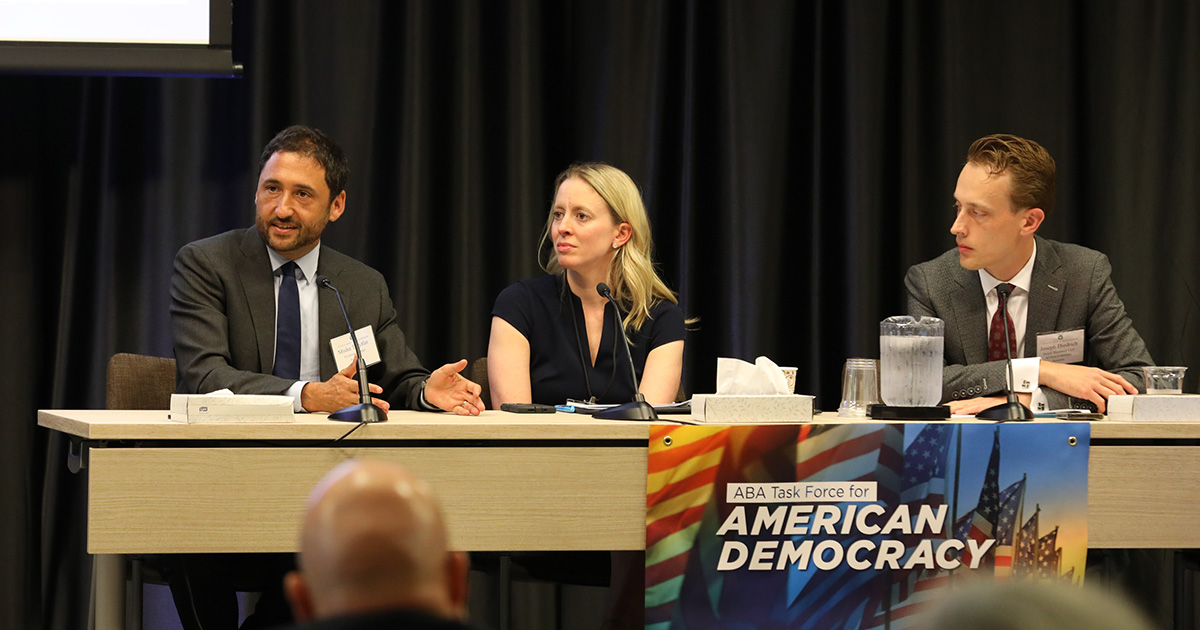
Speaking on the "Nuts and Bolts of Election Law" are, from left: Misha Tseytlin, Erin Deeley, and panel moderator Joseph Diedrich.
Recent Election Litigation
The second half of the event included panel discussions on election litigation, the mechanics of election administration, and media and civil discourse.
Misha Tseytlin , who served as solicitor general at the Wisconsin Department of Justice under Gov. Scott Walker and is now a partner at Troutman Pepper, discussed recent election law litigation on a panel with
Erin Deeley , former deputy legal counsel for Gov. Tony Evers and now partner at Stafford Rosenbaum.
Joseph Diedrich, an appellate litigator at Husch Blackwell, moderated the panel.
Tseytlin and Deeley were most recently opposing counsel and gave oral arguments in two election law cases at the Wisconsin Supreme Court –
Priorities U.S.A. v. Wisconsin Elections Commission and
Evers v. Marklein – decided on July 5.
Tseytlin represented the Wisconsin Legislature as an intervenor-respondent in both cases. Deeley represented Gov. Evers as an intervenor-appellant in one case (
Priorities ), and third-party intervenor-petitioner in the other (
Evers ).
But they teamed up on Tuesday for civil discourse, sharing details about the procedural and other aspects of election litigation in these recent cases, among other topics.
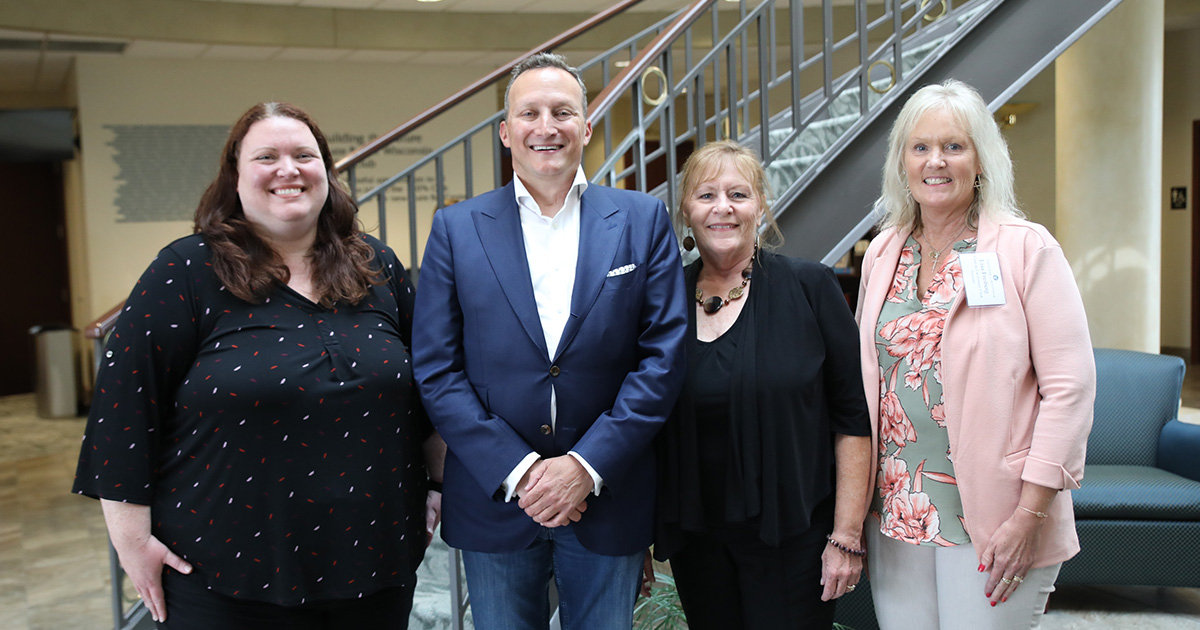
Speakers in the "Election Mechanics" panel are, from left: Lindsay Mather, Green Bay Assistant City Attorney; moderator David Becker, Center for Election Innovation & Research; Kathy Bernier, former State Senator and former Chippewa County clerk; and Lisa Freiberg, Fond du Lac County clerk.
Election Administration
Fond du Lac County Clerk
Lisa Freiberg, Green Bay Assistant City Attorney
Lindsey Mather, and former Wisconsin Senator
Kathy Bernier (R-Chippewa) discussed election mechanics with recent stories and lessons from the 2020 election.
David Becker , executive director of the Washington D.C.-based nonpartisan Center for Election Innovation & Research, moderated the panel.
“I want to put this all into context,” said Becker. “Forty-four months ago, this country held the most secure, transparent, and verified presidential election in its history. That’s not just my opinion. That is an objective fact by every measure.
“There still has not been a shred of evidence presented to any court, anywhere in the country, that would cast any doubt on the outcome of the 2020 presidential election.”
The 2020 election, amidst a pandemic with a 67% turnout rate – the highest since the 1880s – has withstood more scrutiny than any other presidential election in world history, Becker said. But all who try have failed to present any evidence of fraud.
Yet Becker said this country “has seen unprecedented threats directed at public servants who work in all aspects of election administration over the last four years. In many ways, Wisconsin has been ground zero for that.”
“We’ve had employees who have been the subject of harassing phone calls,” noted Mather, assistant city attorney in Green Bay. “Our clerks have been the subject of a lot of negative attention. It’s coming at everybody from all angles.”
Former Sen. Bernier has also endured verbal harassment. “Only because I felt it was important to speak the truth,” said Bernier, a Republican and former Chippewa County Clerk who was outspoken against 2020 conspiracy theories of a stolen election. Bernier is now with a nonprofit organization called Keep Our Republic.
Frieberg, Fond du Lac County Clerk, noted that 33 county clerks have resigned since 2020. At the same time, many people don’t understand the voting and election process.
Independent observers from both political parties, as well as multiple election officials and poll workers, ensure compliance with the law and election process, she said. And countless checks and balances during election administration provide safeguards.
“There are so many eyes on our elections,” Frieberg noted.
Given the election security and transparency noted, such targeted harassment against election officials “undermine the confidence in the elections overall,” Mathers said. “Voters don’t want to come in and vote in person… because of confrontations.”
‘It’s why conversations like this, about the health of our democracy and the realities of how transparent and well-run our elections are, are so critical.”
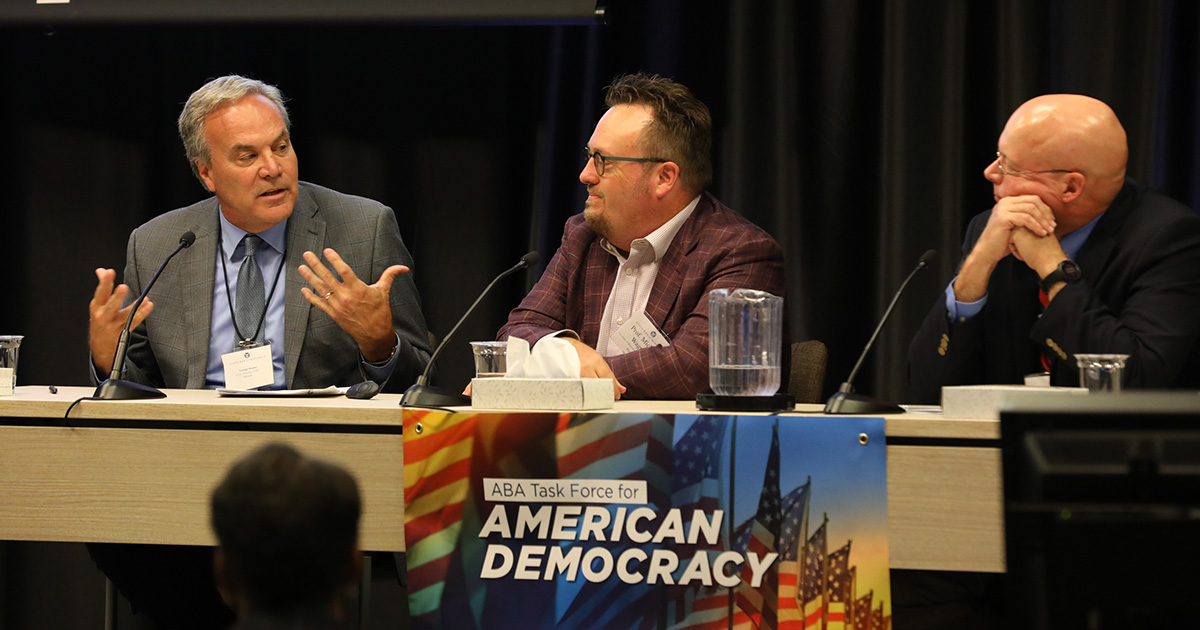
George Stanley, CEO Wisconsin Watch (left), speaks during the panel "Media and Civil Discourse," Prof. Michael Wagner, U.W. School of Journalism (center), and panel moderator, Prof. Chad Oldfather, Marquette University Law School.
Media and Civil Discourse
Professor
Michael Wagner said the number of people who say they have high trust in the media has gone from about 70% in the 1970s to about 20% in more recent years, in a panel discussion on "Media and Civil Discourse," moderated by Marquette University Law Professor
Chad Oldfather and including former
Milwaukee Journal Sentinel editor
George Stanley .
Wagner, who directs the Center for Communication and Civic Renewal at U.W.-Madison’s School of Journalism and Mass Communications, said that voters are split along ideological lines to a greater degree than ever before in U.S. history – including the period just before the Civil War.
The rise of talk radio, 24/7 cable news, and social media has driven right- and left-leaning voters into information bubbles that reinforce their respective opinions while isolating them from people with different opinions, Wagner said.
“We tend to talk to people who are most like ourselves,” Wagner said. “There’s not all that much political crosstalk in our surveys of Wisconsinites.”
What helps people break out of the echo chamber? “Diversity of conversation, diversity of information source,” Wagner said.
“People who have a diverse network of talking to people have about a 25% chance of splitting their ticket. People who have a diverse source of news have about a 50% chance of splitting their ticket. People who only talk to people like them, literally touching zero. People who only look at news from their side, it’s literally touching zero.”
“So elections are won and lost by this very small group of people who have a really diverse network of people they talk to, and a really diverse set of information.”
Wagner’s data, he said, shows that when people think that people on the other side won’t pay attention to them, they choose not to talk to them.
“We’ve decided to close off conversation … which makes it very difficult to build the trust that we have to build in election administration and vote counts and other things to make democracy work, to have the minimal bar to make democracy work.”
Stanley, former editor of the
Milwaukee Journal Sentinel, discussed misinformation, the history of local news, and how organizations like Wisconsin Watch are trying to rebuild the local news ecosystem in the current “opinion marketplace.”
“A lot has changed in the last two decades,” said Stanley, noting that Wisconsin has lost 6 out of every 10 journalists – true nationwide – an average of two local newspapers close every week, and hundreds of news outlets are purchased by cost-cutting chains.
“Swaths of America have little or no local news coverage today and it’s getting worse every year,” Stanley noted. “This threatens the health of our Republic.”
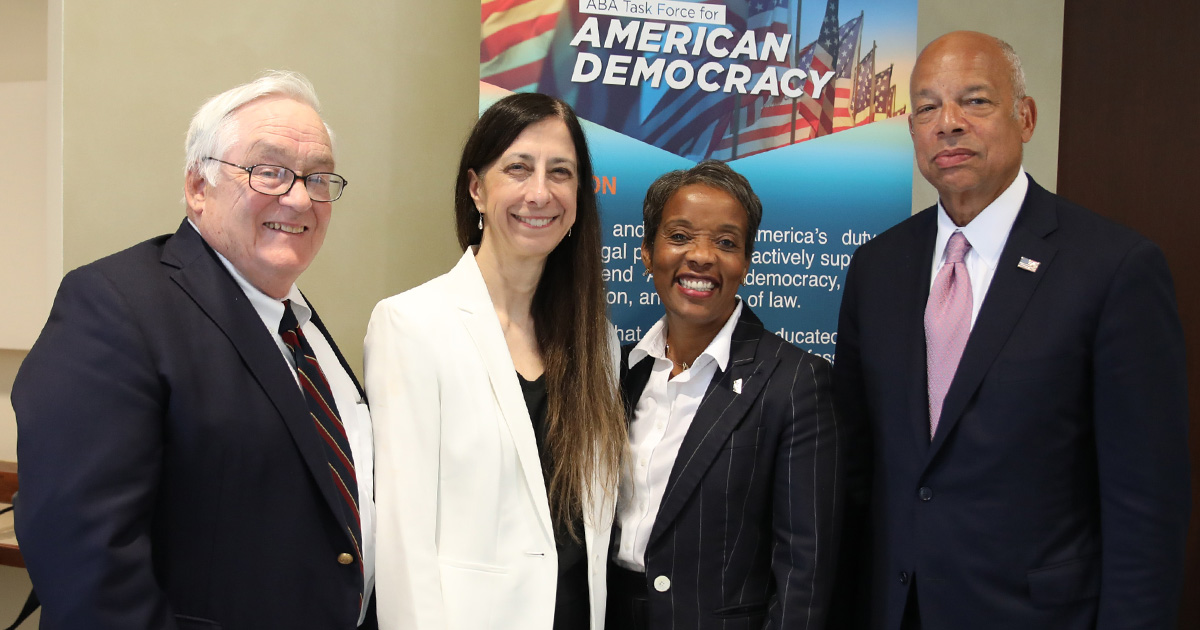
From left: State Bar Past President and Host Committee co-chair John Skilton; ABA President Mary Smith; State Bar Past President and Host Committee co-chair Michelle Behnke; and Hon. Jeh Charles Johnson, ABA Task Force for American Democracy co-chair.
Lawyers Key to Preserving Democracy
John Skilton closed the event by thanking the sponsors: Boardman & Clark LLP, Godfrey & Kahn S.C., Husch Blackwell LLP, Pines Bach LLP, Stafford Rosenbaum LLP, von Briesen & Roper, S.C., and Habush Habush & Rottier S.C., and anonymous donations from retired lawyers.
In his closing, Skilton, retired from law practice at Perkins Coie, harkened back to the Civil War, in which 600,000 Americans were killed. He also pointed out that 25 of the 56 men who signed the Declaration of Independence were lawyers.
“I hope the invitation that this task force gives to participate is one that we take seriously because we need everybody in this room and all lawyers to be fully engaged in the preservation of what we all know to be the most superior form of government known to man,” Skilton said.
Watch the Full Program
